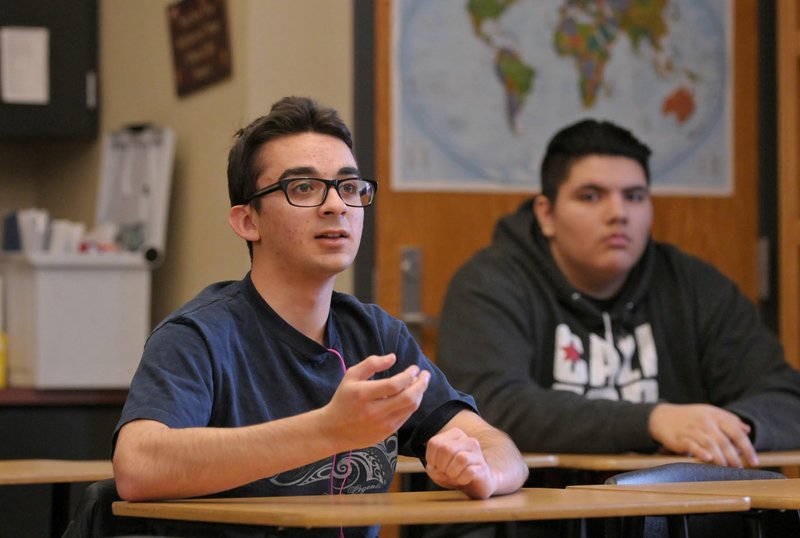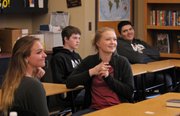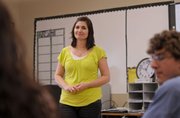Nick Sanford, 17, says his advisory class is making it easier for him to adapt as a new kid at Bentonville High School.
Lora Pate's advisory class has made the transition easier, said Sanford, who has switched schools twice in the past year. Pate offered to make the initial contact when Sanford was uncomfortable going to talk to other teachers.
Enrollment
Public high school enrollments in Benton and Washington counties this school year.
SchoolGradesTotal students
Arkansas Arts Academy9-12242
Bentonville High School9-124,512
Decatur High School9-12153
Elkins High School9-12387
Fayetteville High School9-122,764
Gentry High School9-12469
Gravette High School9-12595
Greenland High School9-12287
Haas Hall Academy9-12250
Haas Hall Academy Bentonville9-12157
Har-Ber High School10-122,182
Lincoln High School9-12503
Northwest Arkansas Classical Academy High School9-1054
Pea Ridge High School9-12453
Prairie Grove High School9-12619
Rogers Heritage High School9-121,857
Rogers High School9-122,072
Rogers New Technology High School9-12541
Springdale High School10-122,347
West Fork High School9-12356
Source: Arkansas Department of Education
"You can ask questions," Sanford said. "You're learning along with everyone else who's learning."
High schools across Northwest Arkansas schedule time at least once a week for students to meet with an adviser who keeps track of how they are doing in their classes, offers guidance on planning for after high school and assists students with social skills. Classes range from 15 to 25 students per adviser.
Advisory programs in many area high schools have been revamped within the last few years to be more consistent and focus more on preparing students for adulthood, high school administrators said.
Students can feel lost without an opportunity to connect with a small group outside of a regular academic class, said Anne Martfeld, who was involved in starting the advisory program at Central Junior High School in Springdale. She is in a new role this year as college and career coordinator for the Springdale School District, with a primary responsibility to oversee the advisory program for middle, junior high and high schools.
"We see the need because our schools have gotten so large," she said.
Thousands of high schools across the country have adopted some form of advisory program, including as many as 3,000 high schools involved in the High Schools That Work program in the past 25 years, said Gene Bottoms, founder and director of the program for the Southern Regional Education Board. The board works with 16 states to improve public education. Gov. Asa Hutchinson is serving as chairman this year.
Advisory programs developed because high schools did not have enough counselors to provide the kind of attention students needed, Bottoms said. While teachers are not trained counselors, the advisory program provides an adult who follows students' progress through high school, helps them decide what courses to take and connects what students learn in class with their personal interests and potential careers.
Connecting to an adult
An advisory program has existed for many years at Bentonville High School, but mostly was time in the middle of the school day for students to meet with their teachers, said Jennifer Power, who coordinates the program.
This school year, students are required to stay in their advisory class for about an hour on Fridays. The adviser checks their grades, attendance, assignments and disciplinary actions, Power said. The adviser can refer them to school counselors for issues that need more attention, Power said. The classes also have team-building activities.
With a student body exceeding 4,300, advisory groups try to provide each student with a smaller community and an adult who looks out for them, Power said.
Advisory classes exist for students in the same grade level, new students and some specialty areas, like yearbook or robotics, Power said.
More than academics
Pea Ridge High School's revised advisory classes are limited to 15 students and meet for 30 minutes daily, said Principal Jon Laffoon. Time is set aside for developing social skills, character and attending to students' emotional needs.
The change responds to a push from business leaders to produce well-rounded students, Laffoon said.
"You can produce someone who is very astute academically who might not be successful in a career," said Laffoon, who said he has seen many examples in his 16 years in education. "It's important to focus on personal responsibility and social development. Time management is a skill. If we're not teaching that, when we turn them loose, are we really serving them when they graduate?"
With nearly a quarter of students coming from low-income families, a new advisory program at Springdale High School is a key part of Principal Pete Joenks' plan to sustain a school culture of being a friendly, welcoming place, he said.
Teenagers begin to create their own identity and look for role models outside the home. The adviser becomes a positive role model for them, Joenks said.
Advisory classes meet three times a week and follow a lesson plan developed by a team of teachers, Joenks said. Topics vary, but one example focused on professional handshaking. Students watched a video, discussed poor handshakes and learned about greetings in other cultures. They had time to practice, Joenks said.
"They thought it was somewhat silly," Joenks said. "When we got done, they were thankful."
New advisory programs were introduced at Springdale and Har-Ber high schools in the fall as a result of the district's federal Race to the Top grant awarded in December 2013, said Marcia Smith, who oversees instruction for middle, junior high and high schools.
Looking toward graduation
Adding ninth grade this year to Fayetteville High School led to a schedule with a special seventh period that blends an existing advisory program with academic enrichment activities, such as club meetings, tutoring and intramural sports, said Deanna Easton, director of student programs.
A recent focus was on preparing students to register for classes for the 2016-17 school year, with the advisers playing a key role in helping students choose courses.
Advisers get to know their students' interests and work to keep them on track through graduation, Easton said.
"We want every single kid who walks through our doors to have a meaningful relationship with at least one adult," Easton said. "It's up to the adviser to push the student in the direction of the student's goals and dreams."
Protecting class time
At Rogers Heritage High School, advisory classes were introduced when the high school opened in 2008, said Principal Karen Steen. The program has evolved so advisers have detailed lists of activities when their classes meet twice weekly.
The classes have about 20 students who are in the same grade and career academy, Steen said. Each student is assigned to one of four career academies.
Steen's list of more than 70 activities during advisory class included club meetings, presentations by colleges and universities, weekly checks on attendance and grades, homecoming nominations and quarterly goal-setting sessions.
Steen and her staff are preparing to implement an advisory curriculum developed by the College Board next school year, she said.
Margaret Elenbarger, a third-year teacher at Rogers Heritage, has an advisory class of freshmen. She says they are a delightful, surprising group trying to figure out who they will become.
"I'm so excited to see what they look like in four years," she said.
NW News on 03/21/2016



